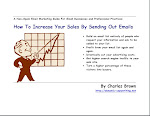I’m reading a really great book on proposal writing called, ”Persuasive Business Proposals” by Tom Sant. It seems that everyone either hates writing proposals or at least finds them a major challenge.
I am a professional writer and while I find it easy to write proposals for someone else, it is a different story when I write them for my own business. Right now I have an unfinished proposal for a potential client sitting on my desk, and I am finding all kinds of creative ways to procrastinate completing it (including writing this article).
One of the really stunning problems Sant addresses early on is how many top-of-their field marketing professionals have developed escape methods of getting out of doing the hard work of writing a quality proposal.
First, he says, is the escape method called cloning. This is the so seductive practice of cutting and pasting sections from a previous proposal that was probably also compiled from someone else’s proposal.
The problem with submitting a boilerplate proposal is that it is all too obvious. These proposals are generic, do not address the client’s problems and goals, and have the appearance of being a mile wide and an inch deep.
Sant relates one consequence that arose from a boilerplate proposal. The president of a large firm called him in because they had submitted a cut and paste proposal to Microsoft that called them “Oracle,” Microsoft’s arch competitor.
The second escape method is the ”data dump,” which consists of piling in every bit of information that can be found to even resemble the topic discussed with the client, and throwing it all together.
The idea seems to be that the heavier the proposal is, the better. Unless the client gets a hernia trying to pick it up, the proposal will not succeed.
Wrong again. Clients don’t want bulk, they don’t want data that doesn’t address the issue. And they don’t want to work to sift through the evidence of your laziness.
Finally, Sant describes what he calls the most dangerous of all avoidance methods, the ”graveyard technique”. Some salespeople will actively avoid the large sale because of the work involved in writing a proposal. These are often the company’s very top salespeople who would rather bring in scads of smaller accounts than go after the big elephant.
Think about the cost to your company this one escape tactic can cause. If your salespeople are avoiding the big opportunities merely because the proposal writing process is too burdensome, your firm needs to implement new procedures.
First, (and this is me speaking here, not Tom Sant) hire out the proposal writing process. I don’t just say this because I am a professional freelance writer, I say this because it is true and important for you to hear. Your salespeople are not writers, and you probably hired them because they processed other skills that serve them well out in the field.
Hire a professional writer who can write proposals that not only inform your potential clients, but also persuade. A proposal must be client centered in order to be effective. It must address its concerns, problems and desired outcomes head on in a way boilerplate products can never achieve.
Think seriously about how much of a price your company is paying by proceeding along with its present practices. A proposal is too important to be left to chance.
And now, if you will excuse me, I have to get my own proposal written.
Labels: proposals



0 comments:
Post a Comment